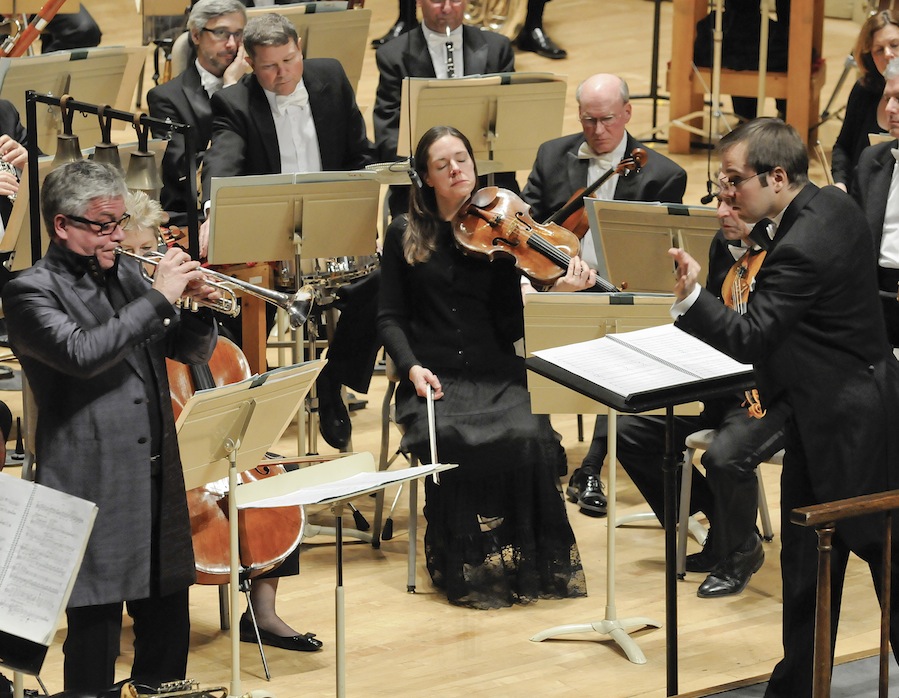Boston Symphony, Hardenberger open the new year with Turnage premiere

Hakan Hardenberger performs the American premiere of Mark-Anthony Turnage's "From the Wreckage" with conductor Marcelo Lehninger and the BSO. Photo: Stu Rosner
Substituting for a substitute — that’s life at the Boston Symphony Orchestra these days.
BSO assistant conductor Marcelo Lehninger led the orchestra Thursday night in a program of works by Haydn, Strauss, and an American premiere by Mark-Anthony Turnage, with performances that ranged from superb to mediocre.
The departure of music director James Levine has resulted in a parade of guest conductors across the Symphony Hall podium, often conducting programs, like this one, that seem to have Mr. Levine’s fingerprints on them.
This concert was to have marked the return of the 33-year-old Latvian maestro Andris Nelsons, who made his BSO debut last March in Carnegie Hall, substituting for Levine in Mahler’s Ninth Symphony. However, another debut intervened: Nelsons bowed out of this engagement because his first child was due any day, and the Brazilian-born Lehninger stepped in.
The concert began unpromisingly with a nobody-home performance of what normally is a sure audience pleaser, Haydn’s rollicking Symphony No. 88 in G major. Although Lehninger appeared to be conducting the first movement’s many twists of color and mood, the players blithely skated past them all. Ragged ensemble on the upbeats was another sign of inattention. However, the Largo was well paced, stately yet affecting, and the Minuet was at least vigorous, though it could have used more local color, especially in the rude, bagpipe-style trio. The finale was dispatched cleanly and with hardly a spark of wit, except for Lehninger’s ill-advised attempt at a Beethoven-style comic slowdown right before the end, which robbed the closing pages of their exhilarating effect.
Mark-Anthony Turnage has found inspiration in the works of such painters as Francis Bacon and Heather Betts, and while is it not linked to any particular canvas of theirs, his trumpet concerto From the Wreckage, composed in 2005, inhabits their world of raw yet strangely distanced emotion. The progress implied in the work’s title could also be called “out of the depths,” since the score calls for the soloist to shift from lower-pitched instruments to higher ones, beginning with the dusky-toned flugelhorn (a sort of baritone trumpet), changing at midpoint to the standard trumpet in B flat, and closing with the brilliant piccolo trumpet. The Swedish trumpeter Håkan Hardenberger brought admirable focus, clarity, and nuance to a solo part that offered few easy opportunities to ingratiate himself with the audience.
Although these instruments are capable of much lyricism and humor, Turnage left those colors off his palette for much of this work, giving the soloist mostly terse, speech-like phrases, or nervous, stuttering ones. The work opens with disjunct notes for the flugelhorn, suspended in an atmosphere of shimmering percussion, but soon a slow, steady pulse establishes itself—a pulse that will persist, audible or implied, for most of the work—and horns wail a blues-tinged lament. As the taciturn flugelhorn gives way to the more agitated trumpet and finally to the bright piccolo trumpet—and the orchestral excitement rises accordingly—one imagines this single-movement work ending in a feverish, even shrill climax.
Instead, Turnage revisits the suspended, enigmatic mood of the beginning, allows (of all things) the piccolo trumpet to glow and sing a little, and closes with the orchestra fading away and the trumpet emitting a lusty cry, like a newborn. (Too bad the new maestro-paterfamilias wasn’t here.) Allowed only a few bars of rest in the whole piece, Hardenberger stayed sure-lipped and focused throughout, fashioning a gripping account of the work with Lehninger and the orchestra.
After the intermission, Lehninger led a performance of Strauss’s Also sprach Zarathustra that had everything the Haydn symphony lacked: color, drive, wit, excitement, and attention both to detail and to the big picture. Economical in gesture, Lehninger gave the impression of physically holding Strauss’s rambling meditation together from the podium, and the orchestra responded with taut, committed playing that was very much in the moment. Spectacle got its due, and musical sense got even more—all in all, an enlightening encounter with a Strauss work that is both too familiar and too little known. And in this case, there was also the added pleasure of hearing a concert emerge, so to speak, from the wreckage.
The program will be repeated 1:30 p.m. Friday and 8 p.m. Saturday. bso.org; 617-266-1200.